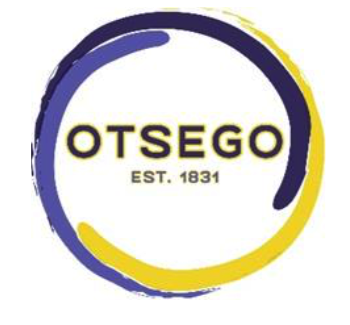
Matt Storbeck
FINANCE DIRECTOR

Lura Holden
ACCOUNTS PAYABLE
Documents
Below are links to PDF files containing the most recently approved annual appropriations bill, as well as the previous fiscal year’s financial statement and independent auditor’s report.
About
Welcome to the Finance Director’s page! I have served as the finance director for the City of Otsego since 1988. As part of my duties, I am also appointed as City Treasurer by the Otsego City Commission. My staff and I take great pride in the level of service and accuracy we provide and we welcome all suggestions for improvement. Lura Holden, our Accounts Payable/Payroll Specialist, is responsible for administration of payroll and employee benefits, purchase orders and accounts payable. Dianna Bork, our Accounts Receivable/Accounting Specialist, is responsible for general ledger maintenance, invoicing, tax administration, accounts receivable and daily cash management. Together we are responsible for the majority of the City’s financial transactions and reporting. If you ever have any questions regarding taxes or other financial matters, please contact our office at (269) 692-2741 or EMAIL US.
Some of the specific duties we are responsible for are:
- compiling, developing and administering the annual budget which is called the City of Otsego Annual Appropriations Bill
- creating purchase orders in compliance with the City’s purchasing policy
- paying all bills in accordance with approved purchases and securing available discounts for early payment
- creating and sending invoices for city services and materials used outside the scope normally provided (mowing of neglected tall grass, street repair of excavation sites by private contractors, new water and sewer connections, etc.)
- weekly payroll and benefit administration for 20 full-time employees, 12 part-time employees and 30 volunteer fire fighters
- property tax administration and billing for over 2,000 parcels of property twice a year
- investing all available funds in accordance with the City’s investment policy
- financial planning, tracking and grant administration of all capital improvement projects
- compiling and maintaining accurate records of the City’s fixed assets which include buildings, contents, vehicles, heavy equipment, park play equipment, decorative downtown lights, water and sewer mains and meters
- compiling all necessary schedules and being able to provide all requested documentation to be used by an outside accounting firm during the City’s annual audit.
We are also responsible for the administration of property tax principal residence exemptions. The principal residence exemption percentage is found on the annual assessment notices which are mailed in March, as well as the summer and winter tax bills which are mailed July 1 and December 1, respectively. Please confirm the exemption percentage when you receive each of these notices and contact us if you find an error. Forms are available at City Hall to update the exemption, if necessary. Please note, however, the principal residence exemption only affects the school operating portion of the winter tax. According to state law, homeowners may file for a principal residence exemption before June 1 or November 1 of the tax year when own and occupy a property.
When you receive your assessment notice in March of each year, dates will be included on it for the days and times where taxpayers can protest their assessment to the City of Otsego March Board of Review. By state statute, March Boards of Review are held the week of the second Monday in March. Please check your notice or the calendar at this site. Written protests can also be considered by the board if received before their last meeting date for appeals. This is the only time period that taxpayers can protest their assessment.
The property tax reform bill passed by Michigan voters in 1994, has essentially required the City to maintain three sets of values for each property. The Assessed Value represents the assessor’s calculation of one-half of the property’s market value. This is the value that can be protested. In the City of Otsego, the Assessed Value has traditionally been the same as the State Equalized Value, which would only be adjusted based upon a significant difference in the Michigan Department of Treasury’s calculation of one-half of the City’s entire value. Because these two values are the same, taxpayers are assured of proper assessing methods.
The new value as a result of the property tax reform bill is called Taxable Value. In 1995, or now when the property is sold, the Taxable Value “uncaps” and becomes equal to the Assessed Value. After that initial year, as long as the property is not transferred, the taxable value cannot increase more than the Consumer Price Index (inflation) or 5 percent, whichever is less. This protects property owners in areas where property values are rapidly increasing or during times of high inflation. The only time a Taxable Value can decrease is if the Assessed Value is adjusted to a level lower than the current Taxable Value. If you have more questions on these values, or types of property transfers exempt from the “uncapping” process, please contact City Assessor Lydia Paille at 269-535-4876.
Taxpayers who meet the qualifications may also apply for tax deferments to delay the due date for their property taxes. Deferment applications are available at City Hall and must be submitted before each tax season’s due date.
The City also has a poverty exemption program whereby qualified applicants may receive lowered assessments for a maximum of three consecutive years. Applications must be filed at City Hall after January 1 of each year and before the December Board of Review in order to receive an exemption for that tax year.
The City participates in the Allegan County Resource Recovery’s Recycling Program. Because of the agreement that the Otsego City Commission entered into with the Allegan County Board of Commissioners, a $25 Recycling Surcharge for each household is added to winter taxes. These revenues are used not only for the City’s curbside recycling program, but are also used to cover the pickup of recyclable materials collected at the City’s Transfer Station, a portion of Allegan County’s Recycling Program, and the pickup of recyclable yard waste such as brush and leaves. Allegan County provides hazardous and electronic material collections on a periodic basis, as well as educational programs within the schools. The surcharge is necessary, therefore, to support county programs, pickup local materials and break them down into reusable manufacturing components. Ultimately, it is our goal to help preserve the life of current landfills and reduce the need for new landfills by recycling all materials possible.

